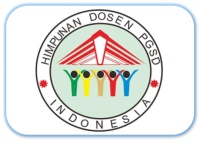PENINGKATAN HASIL BELAJAR IPS MENGGUNAKAN MODEL KOOPERATIF TIPE STAD DI SEKOLAH DASAR
Abstract
Abstract
The purpose of this study was to describe the learning plan, the implementation of learning and student learning outcomes by using the Cooperative Type STAD model in class V SD. This type of research is Classroom Action Research (CAR) using qualitative and quantitative approaches. The subjects of this study were 22 class V teachers and students. The research was carried out in two cycles. Research procedures include planning, implementing, observing, and reflecting. The results of the study from cycle 1 to cycle 2. (a) Learning planning cycle 1 is 89.28% increased to 96.42% in cycle 2. (b) Implementation of learning from the aspect of teacher cycle 1 with an average of 92.22% increased to 97.22%. In cycle 2, from the aspect of students in cycle 1 with an average of 86.94% increased to 97.22% in cycle 2. (c) Learning outcomes obtained by students in cycle 1 obtained an average grade of 75.89 increased to 80 05 in cycle 2. Thus the Cooperative Type STAD model can improve student learning outcomes in social studies learning in Class V SDN 27 Lubuk Alung.
Kata kunci : Hasil belajar; IPS; Kooperatif Tipe STAD
References
Depdiknas. 2006. Kurikulum Tingkat Satuan Pendidikan (KTSP). Jakarta: Badan Standar Nasional Pendidikan.
Kunandar. 2008. Langkah Mudah Penelitian Tindakan Kelas Sebagai Pengembangan Profesi Guru. Jakarta: PT. Raja Grafindo Persada.
Kunandar. 2010. Guru Professional Implementasi Kurikulum Tingkat Satuan Pendidikan (KTSP) dan Sukses dalam Sertifikasi Guru. Jakarta: PT Raja Grafindo Persada.
Kurniasih.2015. Model dan Metode Pembelajaran Kreatif dan Berkarakter. Bogor: Ghalia Indonesia.
Purwanto Ngalim. 2006. Prinsip-prinsip dan Teknik Evaluasi Pengajaran. Jakarta: PT. Remaja Rosda Karya.
Robert E. Slavin. 2007. Cooperatif Learning Teori, Riset dan Praktik. Bandung: Nusa Media.
DOI: http://dx.doi.org/10.24036/e-jipsd.v6i2.3592


